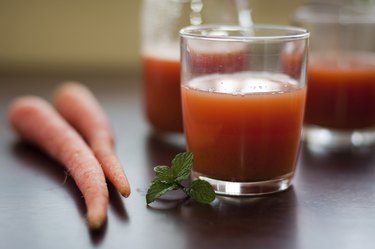
Making the best choice between carrot juice and whole carrots depends on how much you plan to consume. It takes about three to six carrots to make 1 cup of carrot juice, so the juice ends up with a boost of concentrated nutrients and a little fiber. If you will actually eat three large carrots, you'll get the same nutrients and more fiber. What really counts is including carrots in your diet regardless of the form they take.
Portions Matter
Video of the Day
Whether you're slicing raw carrots for a salad or munching on a snack of carrot sticks, chances are you won't eat three to six carrots at one sitting. On the other hand, 1 cup of carrot juice represents a reasonable portion. To provide a baseline of information that resembles one serving, the nutrients in 1 cup of carrot juice are compared to one large carrot. One cup of carrot juice has 94 calories and 2 grams of protein, while one large carrot has 30 calories and 1 gram of protein.
Video of the Day
Fiber Advantage
Some of the natural fiber is lost when carrots are juiced, yet 1 cup of juice still retains the same amount of fiber as one large carrot. Both choices have 2 grams of fiber, which supplies 8 percent of women's and 5 percent of men's recommended daily intake of fiber. You might know fiber best as roughage that prevents constipation. While insoluble fiber does keep you regular, the other type of fiber -- soluble -- provides other vital health benefits. It helps lower cholesterol and prevent Type 2 diabetes, and its ability to make you feel full makes it a good tool for weight management.
Colossal Carotenoids
One cup of carrot juice contains an amazing 45,133 international units of vitamin A, which is more than 1,000 percent of your recommended dietary allowance, or RDA. One large carrot has less but is still an excellent source, providing 400 percent of the RDA. The benefit of getting vitamin A from carrots is that it is in the form of carotenoids, which do not build to toxic levels, according to the Office of Dietary Supplements. The carotenoids in carrots, primarily alpha- and beta-carotene, are antioxidants that your body can also convert into the form of vitamin A needed for your eyes, skin and immune system.
Bone-Boosting Vitamin K
Your liver depends on vitamin K to make proteins that stop bleeding by making your blood clot. However, vitamin K also has another essential job to fill: It helps you maintain strong bones by preventing the loss of bone and by building proteins that promote calcium absorption, according to Bastyr University. One cup of carrot juice has 36.6 micrograms of vitamin K, while one large carrot supplies 9.5 micrograms. If you drink the juice, you'll get about one-third of your recommended daily intake. Eating one large carrot fills at least 8 percent of your daily requirement.
- USDA National Nutrient Database: Carrot Juice, Canned
- USDA National Nutrient Database: Carrots, Raw
- The Wellness Center, University of Illinois at Chicago: What Is Fiber?
- Office of Dietary Supplements: Vitamin A
- Linus Pauling Institute: Carotenoids
- Bastyr University: Vitamin K for Bone Health
- Institute of Medicine: Dietary Reference Intakes: Macronutrients